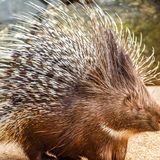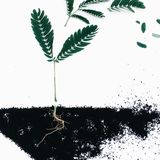RECENT ARTICLES

Stones from porcupine guts are a hot commodity on Instagram
Porcupines have long been captured and sold in the wildlife trade. Some people eat them, and their are used in clothing and other decorative items. Porcupines also produce stone-like collections of undigested plants in their guts called bezoars. from several species, including oxen, and porcupines are used in traditional and folk medicine, particularly in East and countries. One of the dark sides of and other internet sites is that they have become , where hunters can easily sell their wares to buyers around the world. In a published in Global Ecology and Conservation, scientists from...…Porcupines have long been captured and sold in the wildlife trade. Some people eat them, and their are used in clothing and other decorative items. Porcupines also produce stone-like collections of undigested plants in their guts called bezoars. from several species, including oxen, and porcupines are used in traditional and folk medicine, particularly in East and countries. One of the dark sides of and other internet sites is that they have become , where hunters can easily sell their wares to buyers around the world. In a published in Global Ecology and Conservation, scientists from...WW…
Narwhal DNA captured a survival story the last time the glaciers melted
One of the most common ways that scientists study the effects of future climate change is to look into the past. Like a clumsy jewelry thief, fluctuations in Earth's climate over millions of years have left their fingerprints all over: in , ice cores, and ancient tree rings. Animals also have their own built-in historical record, in their DNA.Biologists are turning to genetics to understand what might happen to marine mammals – specifically, – as the Arctic warms. At the end of the Last Glacial Maximum, , the vast Greenland ice sheet rapidly melted, pushing sea levels up by about ten...…One of the most common ways that scientists study the effects of future climate change is to look into the past. Like a clumsy jewelry thief, fluctuations in Earth's climate over millions of years have left their fingerprints all over: in , ice cores, and ancient tree rings. Animals also have their own built-in historical record, in their DNA.Biologists are turning to genetics to understand what might happen to marine mammals – specifically, – as the Arctic warms. At the end of the Last Glacial Maximum, , the vast Greenland ice sheet rapidly melted, pushing sea levels up by about ten...WW…

One person's techno trash is a scientist's research tool
Plant roots are complex and delicate structures that provide the aboveground stem and leaves with nutrients and water. Studying them can tell us a lot about a plant's survival strategy and its associations with soil fungi and bacteria. There's a lot going on beneath our feet that we just can't see.And that's part of the problem: roots are very difficult to study because they are hidden below layers of soil. To , plant biologists must either dig up the plant, an approach aptly referred to as "destructive sampling," or install a see-through chamber called a rhizotron. A rhizotron is kind of...…Plant roots are complex and delicate structures that provide the aboveground stem and leaves with nutrients and water. Studying them can tell us a lot about a plant's survival strategy and its associations with soil fungi and bacteria. There's a lot going on beneath our feet that we just can't see.And that's part of the problem: roots are very difficult to study because they are hidden below layers of soil. To , plant biologists must either dig up the plant, an approach aptly referred to as "destructive sampling," or install a see-through chamber called a rhizotron. A rhizotron is kind of...WW…
- Total 3 items
- 1